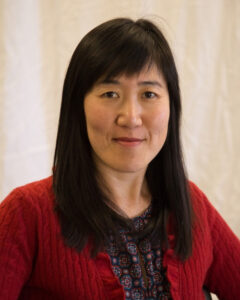This post is written by member Joanna Wong.
As a daughter of Chinese immigrants growing up in a working-class Oakland neighborhood in California, I learned to value cultural and linguistic diversity early in life. I also grew up keenly aware of racial and socioeconomic injustices and how these impacted my own and my peers’ schooling opportunities. This consciousness fueled in me a desire to positively affect educational opportunities and academic achievement for historically underserved communities. I began teaching elementary students and participating in educational reform efforts. Feeling as though I held too many unanswered questions, I pursued a PhD in language, literacy, and culture. My research addresses the writing opportunities and experiences of bilingual elementary students as well as teacher preparation to serve culturally and linguistically diverse students.
Days before walking across the University of California, Davis stage in my doctoral regalia, I received notification that I would be joining the 2014–2016 NCTE Cultivating New Voices among Scholars of Color cohort. While completion of my doctoral degree felt like a monumental achievement, the journey forward remained daunting. However, knowing that I would have the NCTE CNV program to support me over two critical years in my transition from newly minted PhD to (potentially) a new academic faculty member filled me with elation and eased many fears.
Over my fellowship years, this generous community of literacy scholars acted as a vital anchor for me. We convened twice each year, at the NCTE Annual Convention in the fall and on a university campus for the Spring Institute. Our meetings included forums for fellows’ research presentations as well as special topics presentations by mentors and other established scholars. These presentations helped to advance my understanding of research and theories in the field. I valued fellows’ and mentors’ advice, openness in sharing experiences and insights, and constructive feedback to advance fellows’ scholarship.
Another keystone of the CNV program is the partnering of a fellow with an established scholar in the field. Working with Dr. Sarah Warshauer Freedman was a dream come true. I had long admired her scholarship in the field of writing research and writing pedagogy. While I was on the job market during my first fellowship year, Dr. Freedman provided support at all phases of the job search, from reviewing teaching and research statements to helping me to prepare for campus interviews. By fellowship year 2, I had joined the Department of Education and Leadership at California State University, Monterey Bay. During that year, I turned to Dr. Freedman for advice on navigating professional relationships and balancing responsibilities within the university. She also supported me in developing a manuscript from my dissertation that examines the relationship between teacher expectations and fourth-grade bilingual Latinx students’ writing development.
CNV is a family of early and established scholars who actively manifest compassion and cultivate humanizing practices in teaching and learning, in scholarship, and within our academic lives. CNV is a model of true fellowship in the academy. I am so grateful to be part of the CNV family.

Joanna Wong, assistant professor in the CSUMB Elementary Education Program, is committed to preparing teachers to provide culturally and linguistically responsive language and literacy education to diverse students. She grounds her teaching and research in more than 14 years of experience working as an educator in the Oakland Unified School District.

